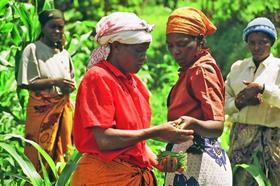
A new report has been released which investigates poverty within the supply chain of the UK's biggest supermarkets, leading Asda to make a series of commitments to ethically minded growers.
Produced jointly by Oxfam and International Procurement and Logistics (IPL), the Asda-owned importer of fresh produce, the report, titled Exploring the Links Between International Business and Poverty Reduction, analyses the fresh produce export sector in Kenya, specifically in relation to the production of green beans and cut flowers. IPL said the study had helped it to gain a greater insight into the issues affecting workers and farmers within this sector, and the best ways to resolve them.
IPL is a massive player in importing fruit from South Africa, where the pay of farm workers was recently increased by 52 per cent following mass protests, and the report similarly identifies thepay of workers in Kenya as an ongoing issue.
It reads: 'Worker wages are insufficient to enable a decent standard of living for workers and their dependants.'The report also slams the treatment of women in the African country, claiming that they are 'highly disempowered'.
IPL, currently the biggest importer of fresh produce into the UK, says it will now, among other pledges, look to financially reward suppliers who provide better-quality jobs, living quarters and higher wages to their workers, as well as ensure women get access to proper childcare and are better protected from harassment.
There will also be an overhaul of IPL's strategy for small-scale producers. The report explains:'We will create an enabling environment for exporters who aggregate supply from small-scale producers to overcome challenges faced by them e.g. more consistent and regular volume demands and better payment terms. We will partner withsuppliers to create an environment that includes small-scale producers in the supply chain e.g. group organisation, training in certification requirements, input provision etc. to develop their ability to meet export demand.'
Nick Scrase, managing director of IPL, added: 'IPL has made a series of commitments to drive a positive impact for small-scale producers and workers which Oxfam believes could affect workers, their families and communities directly within the supply chain.'
Meanwhile, Mark Goldring, CEO of Oxfam, said he now hopes other fresh produce importers will follow IPL's lead and also review their export supply chain practices.'The world food system is a topic of enormous importance to Oxfam and it is clear that, with one in eight people in the world without enough to eat, this is a system that is not fit for purpose. We hope for positive reports on IPL’s progress in meeting our recommendations in addition to seeing other companies re-evaluating their own impacts and being open about the challenges.”
Furthermore, the reportrevealed positive progress from Kenya's horticulture sector on issues such as ethical trading and the Fairtrade movement, as well as proof of safer pestitcide use on farms.



